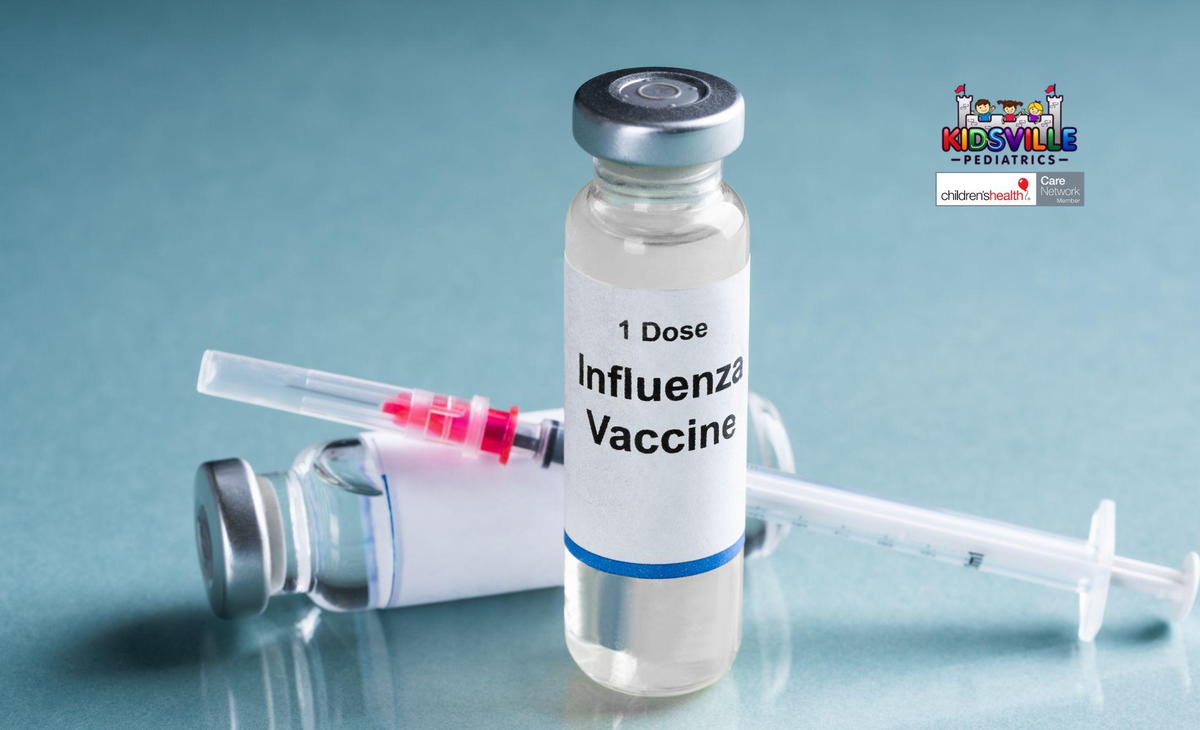
As flu season approaches, it’s natural to have concerns about keeping your child healthy. You might be wondering about the best ways to protect your family and what steps you should take to ensure your little one is well-prepared. At Kidsville Pediatrics McKinney, we understand how important it is for parents like you to stay informed about flu season and vaccination.
This season can bring about a range of challenges, from navigating the symptoms to managing potential complications. Vaccination plays a crucial role in preventing the flu and keeping your child’s immune system strong. You want to make the best choices for your child’s health, and understanding the importance of the flu vaccine is a key step in that process.
As you prepare for the upcoming flu season, it's essential to know what to expect and how to take action. In this guide, we’ll explore the role of flu vaccinations, how they protect your child, and what you should be aware of as a parent. Whether you’re a first-time parent or looking for a refresher, this information will help you make informed decisions.
By understanding the benefits of flu vaccinations and consulting with a pediatrician in McKinney, you can help safeguard your child against the flu and navigate the season with confidence.
Understanding Influenza and the Flu Vaccine
 Influenza, commonly known as the flu, is an infection that affects the lungs, nose, and throat. Caused by influenza viruses, this illness can range from mild to severe. While many people recover from the flu without any issues, young children are at a higher risk of developing serious complications such as pneumonia or ear infections. As a parent, it’s crucial to be aware of how you can protect your child from these risks.
Influenza, commonly known as the flu, is an infection that affects the lungs, nose, and throat. Caused by influenza viruses, this illness can range from mild to severe. While many people recover from the flu without any issues, young children are at a higher risk of developing serious complications such as pneumonia or ear infections. As a parent, it’s crucial to be aware of how you can protect your child from these risks.
The flu vaccine is a key defense against the flu and its complications. It significantly lowers the risk of severe illness and death associated with the flu. For both healthy children and those with underlying medical conditions, getting vaccinated is essential. According to the Centers for Disease Control and Prevention (CDC), it's recommended that all children aged 6 months and older receive the flu vaccine each year, ideally by the end of October. Protection from the flu develops within two weeks after vaccination.
How the Flu Vaccination Works
The flu vaccine cannot give your child the flu. It contains either particles resembling the flu virus or a weakened form of the virus that cannot cause illness. This vaccine prepares your child's immune system to fight off the flu if exposed.
When to Get the Flu Vaccine
If your child is 9 years or older, one dose is typically sufficient for protection. Children younger than 9 who have previously received two or more flu doses are also covered with one dose. However, if your child is 6 months to 8 years old and has never had the flu vaccine before July 1, 2023, they may need two doses given four weeks apart. It's wise to schedule the vaccine appointment as soon as it’s available to ensure full protection by October.
Options for Flu Vaccination
You have the option of choosing between the flu shot and the nasal spray flu vaccine, depending on your child's age and health status. The flu shot is suitable for children 6 months and older and might cause mild side effects like soreness at the injection site or a low-grade fever. The nasal spray is typically available for children 2 years and older, though it’s not recommended for children with certain health conditions.
Before Getting the Flu Vaccine
If your child isn't feeling well or has a history of severe reactions to flu vaccines, consult your child's doctor before proceeding. Your pediatrician in McKinney can offer guidance on alternative ways to protect your child from the flu if necessary.
By ensuring your child receives their flu vaccination, you help safeguard their health and well-being during the flu season.
Debunking Common Flu Vaccine Myths
Myth 1: Influenza Isn’t Serious, So I Don’t Need the Vaccine
You might think the flu isn’t serious enough to warrant a vaccine, but the reality is quite different. The flu is responsible for up to 650,000 deaths annually, just from respiratory complications. Even if you’re healthy, the flu can lead to severe complications such as sinus infections, ear infections, pneumonia, and inflammation of the heart or brain. Protecting yourself with the flu vaccine is crucial to prevent these serious outcomes. McKinney pediatricians stress the importance of vaccination to keep you and your family safe.
Myth 2: The Flu Vaccine Can Give My Child the Flu
It’s a common misconception that the flu vaccine can cause the flu. In reality, the injected flu vaccine contains an inactivated virus that cannot give you the flu. If you experience mild symptoms like aching or a slight fever, this is a normal response of your immune system and usually resolves within a day or two. This reaction indicates that the vaccine is working to build your immunity.
Myth 3: The Flu Vaccine Causes Severe Side Effects
Many people worry about severe side effects from the flu vaccine, but such occurrences are extremely rare. The flu vaccine is proven to be safe, with severe reactions like Guillain-Barré Syndrome (GBS) occurring in less than one in a million people. GBS is a serious condition causing muscle weakness and paralysis but is an exceptional risk.
Myth 4: The Flu Vaccine Doesn’t Work if You Get the Flu
While the flu vaccine targets specific strains, several flu viruses circulate each season. Therefore, it’s possible to get the flu despite being vaccinated. However, the vaccine still improves your chances of avoiding the flu or experiencing a milder case, which is especially important for those with vulnerable immune systems.
Myth 5: Pregnant Women Should Not be Administered the Flu Vaccine
Pregnant women are advised to get the flu vaccine as their immune systems are naturally weaker during pregnancy. The inactivated flu vaccine is safe at any stage of pregnancy and helps protect both mother and baby from the flu.
Flu Shot Side Effects

As a parent, it’s helpful to know that the flu shot may cause some mild side effects in your child or teen. These are generally short-lived and go away within a few days. Common side effects are redness, swelling, or soreness at the injected area. Your child might also experience a low-grade headache, fever, nausea, muscle aches, and fatigue. Occasionally, the flu shot can cause fainting, though this is rare. These reactions are normal and indicate that the vaccine is working to build protection against the flu.
Despite getting the flu vaccination, there are a few reasons why your child might still show flu-like symptoms:
Other Respiratory Viruses: The flu vaccine is designed to protect against influenza viruses specifically. However, other viruses such as rhinoviruses or SARS-CoV-2 (which causes COVID-19) can cause similar symptoms and may be circulating during flu season.
Timing of the Vaccine: If your child is exposed to flu viruses shortly before or during the two-week period after vaccination, they might contract the flu before the vaccine has fully taken effect.
Vaccine Effectiveness: Flu vaccines can vary in their effectiveness. If the flu strain in circulation differs from the strain in the vaccine, protection might be lessened. Nevertheless, the vaccine still helps reduce the severity of illness even if a different strain is involved.
Even if your child gets the flu after being vaccinated, the flu shot offers several benefits:
Reduced Severity: Research has shown that flu vaccination can significantly reduce the severity of the illness. For instance, a 2017 study revealed that vaccinated individuals had lower rates of severe outcomes, such as death and ICU admissions, compared to those who were not vaccinated.
Fewer Hospital Stays: A 2018 study found that vaccinated individuals who were hospitalized with the flu spent an average of 4 fewer days in the hospital compared to unvaccinated patients.
Flu Vaccination and Egg Allergies
If your child has an egg allergy, no worries, they can still receive the flu vaccine. The guidelines have been updated, and there is no longer a need for special precautions beyond those recommended for any vaccine. All vaccines should be administered in a setting where allergic reactions can be quickly managed.
For expert advice and to schedule your child’s flu vaccination, visit Kidsville Pediatrics McKinney. Protect your family’s health this flu season with the help of our knowledgeable pediatricians.
Caring for Your Child After the Flu Vaccine
Preventing Fainting After the Vaccine
Sometimes, children, especially teens, may faint after receiving a flu shot. To help prevent this, encourage your child to sit or lie down for about 15 minutes immediately after the vaccination. This simple step can reduce the risk of fainting and ensure a smoother recovery.
Managing Side Effects
If your child experiences any side effects from the flu vaccine, such as soreness or mild discomfort, you can discuss with your pediatrician in McKinney TX about using acetaminophen or ibuprofen to alleviate these symptoms. Be sure to follow your doctor’s guidance on the appropriate dosage for your child. Additionally, applying a warm, damp cloth or a heating pad to the injection site may help ease soreness. Encouraging your child to use or move the arm or leg where the shot was given can also be beneficial.
When to Delay or Avoid the Flu Vaccine
While minor colds or other minor illnesses generally should not delay the flu vaccine, more serious health conditions might require rescheduling. Consult your pediatrician McKinney TX team if your child has had a severe allergic reaction or any allergic reaction to a previous flu vaccine, or if they have a history of Guillain-Barré Syndrome.
It’s crucial to evaluate whether the vaccine is suitable based on your child’s medical history.
With the rise of respiratory infections due to changes in public health measures, it’s more important than ever to get your child vaccinated. This season, consider having your child receive the flu vaccine alongside updated COVID-19 and RSV vaccines. However, if your child is currently experiencing a respiratory infection, it’s best to wait until they have recovered before scheduling their vaccines. This helps avoid confusion between illness symptoms and vaccine reactions, and ensures the nasal spray flu vaccine is effective.
Pediatrician Near Me: When to Consult Your McKinney Doctor
Reach out to your pediatrician if your child has a fever or seems unwell after receiving the vaccine and you’re unsure about rescheduling this flu season. Also, contact your McKinney doctor if you notice any problems or unusual reactions following the vaccination.
For expert advice and to ensure your child’s health is well managed, visit Kidsville Pediatrics McKinney.
You may schedule an appointment online: https://www.kidsvillepeds.com/appointment/ Or visit/call our clinics: Kidsville Pediatrics McKinney: 469-885-9400; 5881 Virginia Pkwy. Suite 300 Mckinney, TX Kidsville Pediatrics Mansfield TX: 682-341-3910; 1759 Broad Park Circle S, Suite 201 & 205, Mansfield, TX Kidsville Pediatrics Southlake: 682-345-8010; 2813 W. Southlake Blvd Suite 100 Southlake, TX |


